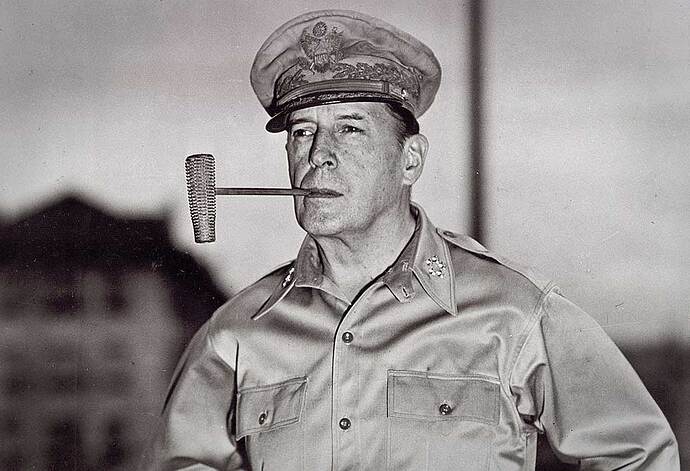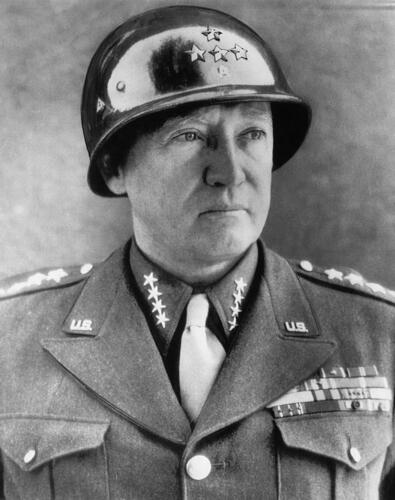I think I already know the answer, I know I have my own opinion. But I’m curious about what our other Forum members think. My criteria for being a good general is 1) Obtaining the required goal 2) A good strategist 3) Being innovative 4) Boldness when necessary, and caution when necessary 5) and an ability to utilize the talents of his subordinates and the troops under his command.
I’m a lot better informed on MacArthur than Patton, but we’re not comparing apples with apples.
MacArthur was a national commander in the Philippines and later the SWPA theatre commander, which gave him much greater control over strategy and also removed him further from the fighting troops and the tactical command that Patton exercised.
MacArthur was also continuously commanding units in combat from the start to the end of the Pacific War as well as being heavily involved in strategic planning beforehand, while Patton’s war commanding units in combat was considerably shorter and he was not involved in strategic planning at a level similar to MacArthur’s.
There are other factors which prevent them being fully comparable, not least the ‘Germany First’ policy which saw much greater resources given to the American effort against Germany than Japan; the very different types of war waged by very different enemies in North Africa and Europe compared with the Pacific; the very different geography and logistical aspects between a primarily land based war against Germany compared with the dispersed islands in the Pacific which was as much or more a sea than a land war; and the fact that Patton’s tanks wouldn’t have been able to operate on many of MacArthur’s battlefields so that Patton’s aggression would have been brought to a standstill by nature.
That said, I think there is no contest on who was the best commander at any level involving commanding and leading troops in combat. Patton meets all your 5 criteria and excels in many of them throughout his combat operations. MacArthur fails all of them in his Philippines phase and in his early SWPA phase until well into 1943, but judged objectively became a competent theatre commander in the last couple of years of the war but nowhere near as good as his self-promoting propaganda still leads many people to think he was some sort of strategic genius for his island hopping strategy, which was merely part of a wider strategy pursued in his SWPA and in the Central Pacific under Nimitz and in which the early island hopping operations were undertaken by Nimitz’s forces long before MacArthur got out of New Guinea in 1944.
In relation to your specific criteria:
- Obtaining the required goal
MacArthur’s failure in the Philippines and his early failures in Papua in 1942 were spectacular failures to obtain the required goal, and both attributable to his personal conceit that he was a great commander when he had failed to plan, prepare and train his forces adequately. Patton never managed to descend to anything remotely like these failures. Perhaps the worst that could be said of Pattton is that in Europe he advanced too far too quickly and outran his lines of communication. Against that, his disengagement of his 3rd Army from battle and moving rapidly to relieve Bastogne was a triumph of command (because he had trained his Army to a level of skill where it could pull off the very difficult task of disengaging on a large front and separately to cover 100 miles in a few days and fight hard and well at the end of it ) and leadership (because it reflects the standards and training he imposed on his Army and his troops’ willingness to follow him) for which there is nothing remotely comparable in MacArthur’s history. MacArthur’s successes in the last two years of the war demonstrate no more than capable command when he was satisfied he had adequate resources to launch a campaign at his chosen time.
- A good strategist
MacArthur didn’t come up with anything uniquely his own and original in the SWPA, while he was an abysmal failure in preparing for the long anticipated Japanese attack while commanding in the Philippines. Patton didn’t have that level of control over strategy, but to the extent that his commands allowed him high level tactical control it suggests that he would have been vastly more effective than MacArthur had Patton been in MacArthur’s position.
MacArthur’s determination to recapture the Philippines is a contradictory strategy for the supposed island hopping genius. By the time he got there in October 1944 Nimitz had captured the Marianas a few months earlier and was a lot closer to Japan than the Philippines, while there was little or no threat to Nimitz’s advanced forces from the Japanese land and air forces in the Philippines. Although the final decision to recapture the Philippines was not MacArthur’s alone, it seems to have been based as much or more on an American sense of duty to the Filipinos to liberate them as soon as possible, which was urged by MacArthur in pursuit of his personal redemption for his abject failure to defend the Philippines competently in 1941-42 and to fulfil his “I shall return” pomposity and conceit. Admittedly, without the Philippines invasion the IJN would not have been finished off by the USN as an effective force at Leyte Gulf, but it would have been only a matter of time before that happened somewhere else in another major engagement or several smaller ones. Had the Philippines been bypassed as an island hop it is arguable that the war would have been prosecuted more effectively by diverting those American troops and all the associated air, naval, merchant marine and logistical resources to the Central Pacific to concentrate on the thrust towards Japan.
MacArthur’s strategic aims in the SWPA were clearly infected by his personal desire to recapture the Philippines he had incompetently lost rather than a dispassionate assessment of the value to the war effort of recapturing them. Subordinating the total war effort to personal ambition and redemption is not the sign of a great strategist.
To the extent that he could influence strategy, Patton didn’t suffer from MacArthur’s flaws so, by default, he ends up a much better strategist.
-
Being innovative
See 1). -
Boldness when necessary, and caution when necessary
MacArthur as a commander was never bold, except when, for example in Papua in 1942, exhorting his troops to achieve more than was possible in circumstances he didn’t understand on a battlefield he hadn’t even seen against an enemy which had already defeated him in the Philippines. Oh, and bold without restraint when puffing himself up through his personal propaganda unit. Unnecessarily cautious, as when refusing to give his air force commander the war plan agreed orders to carry out bombing missions on the outbreak of war and thus losing his bomber force mostly on the ground. Patton probably lacked caution when necessary, in the sense of necessary = hindsight being aware of all possible risks such as at Bastogne and how it could turn out much worse, but as with British General O’Connor in Operation Compass in North Africa fortune often favours the incautious and determined commander with well trained and well motivated troops who seize and maintain the initiative.
- and an ability to utilize the talents of his subordinates and the troops under his command.
MacArthur wasn’t deficient in this area, such as sending General Eichelberger to Buna in 1942 to achieve the remarkable feat of quickly turning a stalled and ineffective 32nd Infantry Division into a useful fighting force in the field. However, the talents of subordinates which MacArthur used most consistently and most effectively were those of his personal propaganda unit. Patton wasn’t short on self-promotion either, but he imbued those under him with loyalty and spirit which, as many of his troops disparagingly called him, Dugout Doug widely failed to do. That was somewhat unfair as MacArthur never lacked personal courage and at times exposed himself to danger to inspire his troops, but he was more of a military politician than the aggressive warrior Patton embodied.
Overall, and despite my well founded contempt for MacArthur’s self-promotion which has created an undeserved image of a great strategist and commander in the uninformed public mind, MacArthur as essentially a desk commander consolidating his forces before he made his major moves from 1944 was probably much better suited to the SWPA than Patton as an aggressive warrior in the field would have been, and vice versa. But as a strategist in the SWPA, I suspect that Patton would have been free of MacArthur’s obsession with recapturing the Philippines and might have been more useful working in combination with Nimitz than the jealous MacArthur was.
Result, on a relative scale of 10 with 10 being the better of the two and allowing for the various differences in their levels of command and theatres:
Patton: 10
MacArthur 1941-42: 1, maybe 2 on a very good day
MacArthur 1943: 3 to 4
MacArthur 1944 onwards. 5, maybe 6 if I’m feeling generous.
Thanks for your analysis, it is very thorough. You mention the point that Patton wasn’t really involved in overall strategy, I hadn’t really even considered that aspect, so thanks for setting the record straight. I’m inclined to agree with you, but I would grade Patton a 9, while MacArthur’s grades are more than fair. And if I remember correctly, the Germans were more respectful of Patton than anyone else.
Patton’s 10 was just an arbitrary figure limited to rating the better of him and MacArthur, rather than Patton in comparison with other Allied generals. Your 9 is probably fair overall as I don’t have an extensive knowledge of all Allied generals in Europe / North Africa etc in WWII, but I think anyone who could pull off Patton’s extraordinary disengagement and relief of Bastogne is on that event a 10+++ on any scale from 1 to 10 as it reflects the deep training, military skill and exceptional espirit de corps he engendered in the 3rd Army, as well as his forward thinking and high level tactical skill ahead of Eisenhower in preparing plans for this before being asked to do it.
My understanding is that the Germans considered Patton to be their equivalent, and their only equivalent among the Western Allies (no idea on the Soviets), in armoured tactics and warfare.
It says plenty that after the war American troops who served under Patton were generally very proud to say they had done so. I don’t think MacArthur created that sort of pride in those who served under him.
I really can’t find much other than his surprise landing in Korea that Macarthur accomplished. He marched on the bonus soldiers during the depression. He got men needlessly killed in the Pacific just to feed his ego. He was fired by the President. Really what did this man do? Patton, although eccentric and wealthy, was a true blood and guts, hard driving general. He was authentic. MacArthur was contrived.


